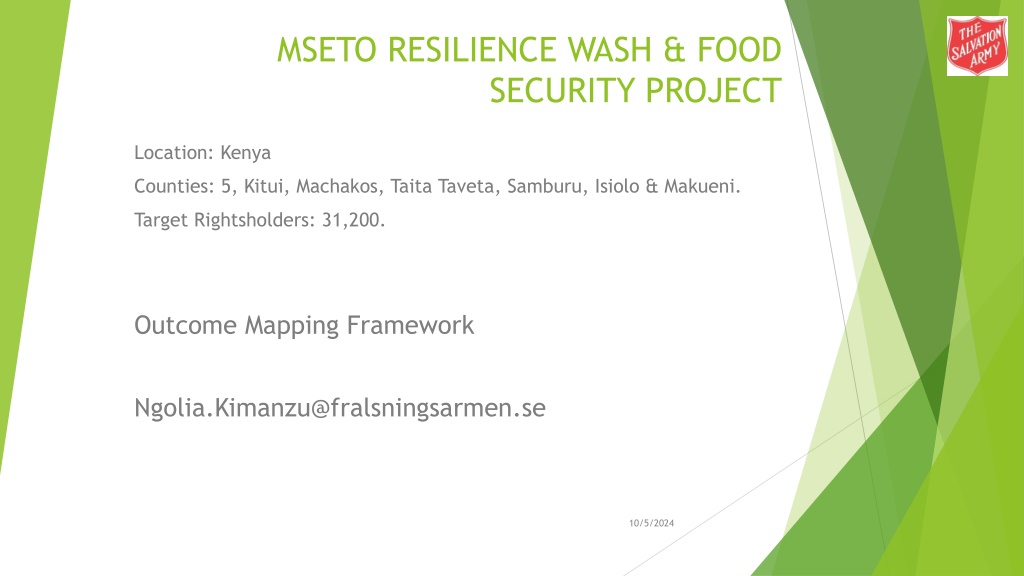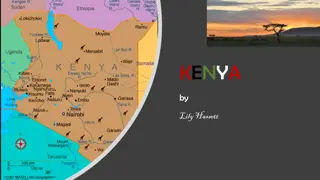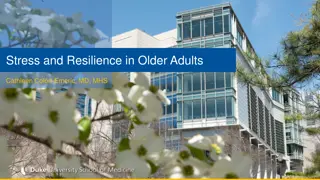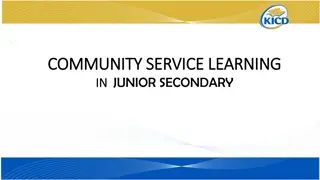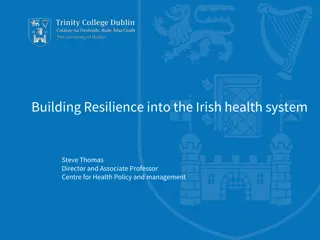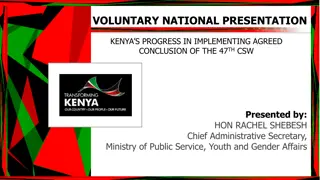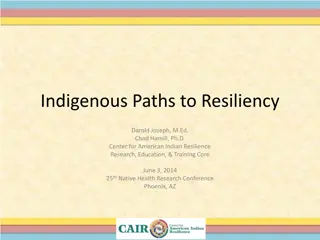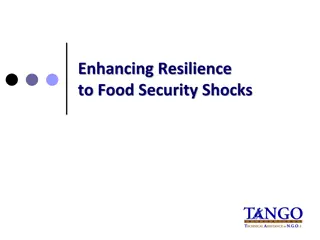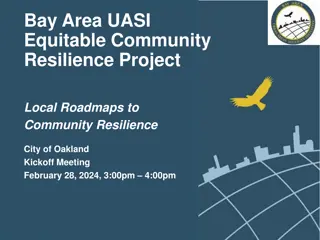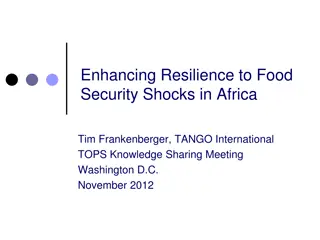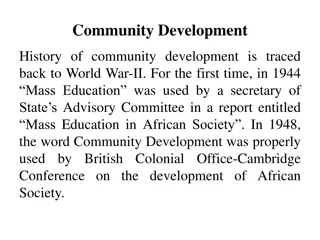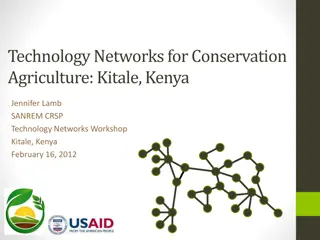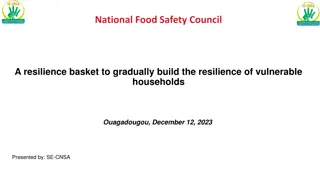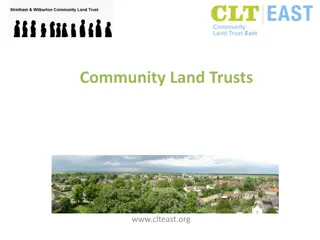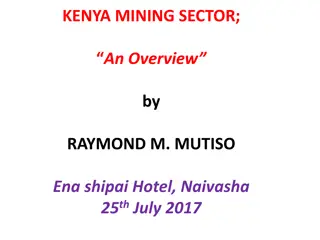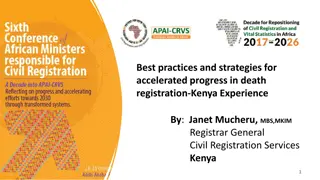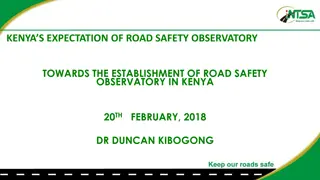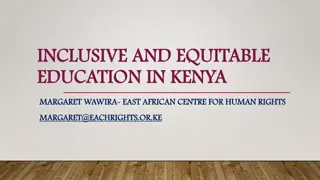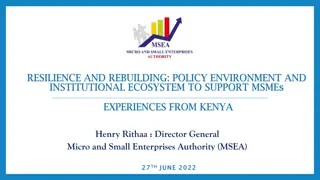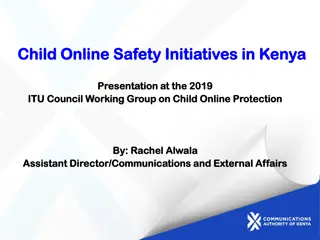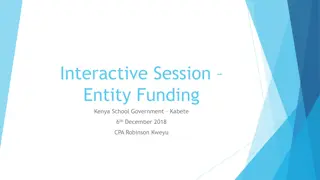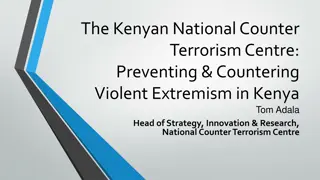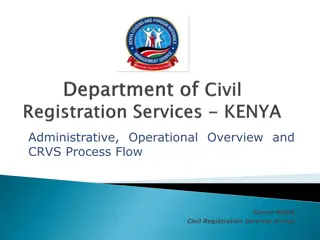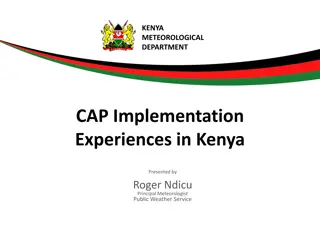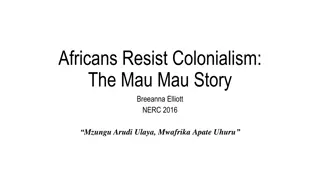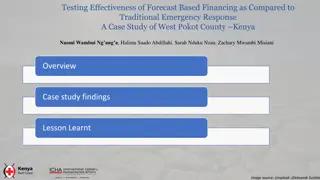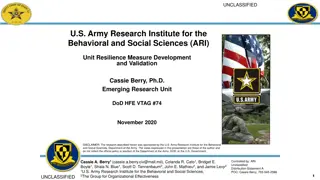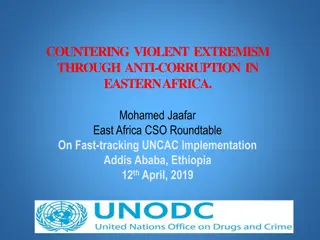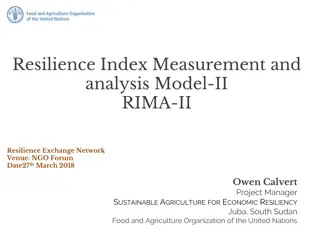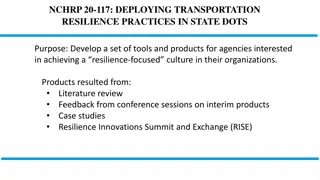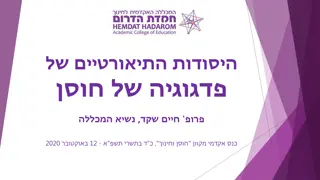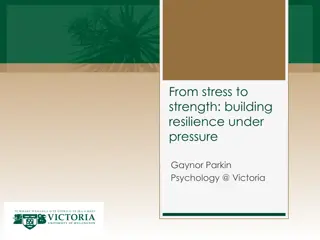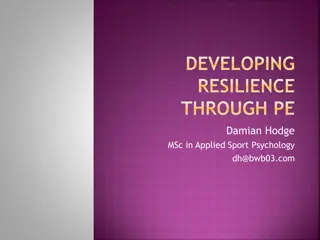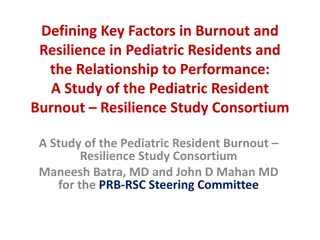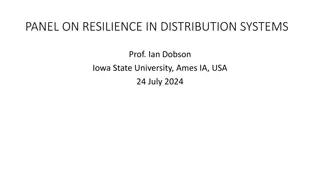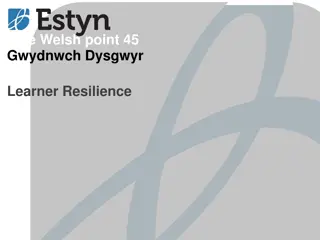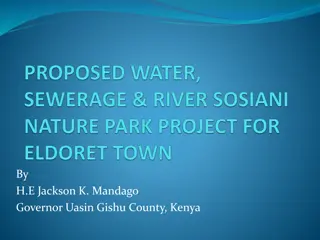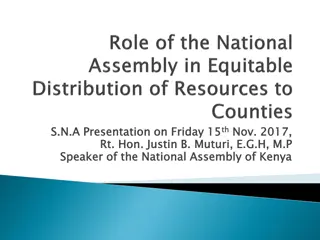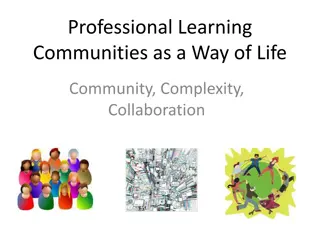MSETO Resilience Project in Kenya: Empowering Communities for Sustainable Development
The MSETO Resilience project in Kenya aims to enhance community resilience and food security in five counties. With a focus on WASH practices and education, the project targets 31,200 rightsholders, empowering them to claim their rights and access essential services. Through partnerships with schools and local communities, the project addresses infrastructural challenges, promotes hygiene practices, and strengthens governance structures to ensure sustainable development outcomes.
Download Presentation

Please find below an Image/Link to download the presentation.
The content on the website is provided AS IS for your information and personal use only. It may not be sold, licensed, or shared on other websites without obtaining consent from the author. Download presentation by click this link. If you encounter any issues during the download, it is possible that the publisher has removed the file from their server.
E N D
Presentation Transcript
MSETO RESILIENCE WASH & FOOD SECURITY PROJECT Location: Kenya Counties: 5, Kitui, Machakos, Taita Taveta, Samburu, Isiolo & Makueni. Target Rightsholders: 31,200. Outcome Mapping Framework Ngolia.Kimanzu@fralsningsarmen.se 10/5/2024
Vision Communities aware of their rights and able to effectively claim them from moral and legal duty bearers. They access and use both preventive and curative health services. They have adequate access to WASH knowledge and services. They are able to rehabilitate, protect and conserve the environment. They are food secure throughout the year as well as resilient to shocks and stressors . 10/5/2024
Mission The project will engage government and other duty bearers to ensure an enabling environment for communities to engage in their own development. The project will develop capacities for communities to analyze their own development challenges, address WASH and food security constraints, and access and utilize economic opportunities . 10/5/2024
BOUNDARY NAME PARTNER BASELINE SITUATION OUTCOME CHALLENGE Boundary Partner 1: The School (The teachers, the BOM, the Parents, the Pupils, the Alumni & well- wishers) The public primary schools in the area have a known sponsor from the church, some schools having sponsorship from The Salvation Army. The sponsor sits as a member in the BOM. The schools need to provide a safe and conducive environment for learning and working. This is not the situation in most cases as the infrastructure is poorly starting right from the classrooms, offices and classrooms are overcrowded. The sanitation facilities are usually not enough for the required ratios, poorly constructed and also poorly participation of the parents, alumni, surrounding community in the school development has left many a school infrastructure in a deplorable state. The school is also made up of the teachers, pupils, parents, board and the alumni who each have a responsibility to play Outcome Challenge 1: The school community takes stock of existing situation and improves the infrastructural issue that do not require external finding. The school community to continually improve neglected facilities and activities. Pupils to take up good hygiene practices in the school including proper use of sanitation facilities, cleaning of classrooms and compounds, access to clean water and effective handwashing behavior especially owing to the Covid-19 disease. School management and community to jointly improve and install facilities to meet the required ratios, improve access to clean safe water and to have health and hygiene education propagated through rights of children clubs. All responsible parties to see that the rights of the children are upheld by all including the legal and moral duty bearers- to have children who know their rights as right holders and can claim them from the duty bearers. A strengthened BOM able to plan for continuous development, maintenance and sustainability of all resources within the school toilet facilities. Some maintained. Low 10/5/2024
Boundary Partner 2: The Local Community (The Investor Groups, Registered community Groups of PLWD, Working Groups) Community groups in existence are either not registered and even if registered lack the knowledge and capacity empowerment of community members. Farming being the backbone of the community is also practiced without strategies to improve the soil structure or soil fertility to improve yields. Climate smart agriculture methodologies lacking or not implemented. The lack of participation and representation in the county meetings means that the views of the community sometimes do not reach the decision makers Outcome Challenge 2: The local community have the capacity to implement VSLA for members economic empowerment. They hold regular meetings, borrow and loan to members. Inclusivity is observed in all groups and community structures. Working groups in place where farmers are trained and practicing sustainable agriculture, soil conservation, crop rotation among others for best yields and thereafter have options for the best marketing strategies. Working groups train on best storage practices to ensure reduction of post-harvest losses. The community members train and participate in decision making for development and be advocates on environmental and climate justice. groups, Community for economic 10/5/2024
Boundary Partner 3: The Government (Ministry of Health, Ministry of Education, Ministry of Agriculture, Ministry of ICT and Youth affairs, etc.) The functions of the Ministry of Education remain at the helm at the national government, while those of Health and Agriculture have been devolved to the counties. The County government offers direction to the sub counties, cascading down to the wards and villages. County budgets are discussed at the County Integrated Development Plan meetings. representatives are invited to the meetings to prioritize on development needs (though it is not always that all views are represented). The Ministries converge as they deliver services to the people to ensure that they attain the highest level of good health through good nutrition, seeking for preventive and curative health services and advice when not well, involving the youth through creating programs for life skills development and ensuring that the pupils in the schools and institutions are learning in a conducive environment with the required facilities ranging from infrastructure to the recommended ratio of human resources deployed. Outcome Challenge 3: The government is the main legal duty bearer and it is responsible for service delivery to the rightholders by law and right. The National government ministries will take lead in technical trainings and offering development initiatives cognizant of the fact that the CSOs role is to ensure those rights are fulfilled. Ministries will take the lead in development of the counties through relevant activities Health, sustainable Sanitation, Inclusion development among others. and County The community in improved Agriculture, and Youth 10/5/2024
Boundary Partner 4: Other NGOs, CSOs, County stakeholders and Partners A number of national, international and civil society organizations are working on development with community members on the ground. Sometimes to the detriment of the community, there is a duplication of activities and wastage uncoordinated activities. Outcome Challenge 4: The NGOs and CSOs are working in coordinated harmony to reduce duplication and holding the Government accountable in fulfilling its obligations. of resources due to Boundary Partner 5: Salvation Army( officers in all ranks) Salvation Army officers are central for the project to function well and most of them lack better understanding of the project. Outcome Challenge 5: Officers create a good working environment whereby there is synergy between the communities, project staff and the salvation army corps in the project area and THQ. 10/5/2024
Progress Markers Outcome Challenge 1: Progress Markers Baseline L M H Progress Made Compare to Baseline Expect to see: School i The boards have now been sensitized on the need of having monthly meetings to steer the school s development. Boards of Management meeting regularly to discuss on the project progress, develop terms of reference and ensure that gender and disability inclusion is paramount Currently most boards meet only once per term ii Only 5 out of 24 schools had these clubs. Now, Close to 13 have formed and trainings will be held in the next quarter. Pupils willfully forming ROC clubs, electing officials, and maintaining self-discipline in the school Schools functional clubs in the school have not embraced iii The school community and the alumni attending meetings called community The school has been left to the parents, guardians and school management only development for in the 10/5/2024
Like to see: School iv Boards of management developing action plans for the school, actively mobilizing for resources and for the participation of community and partnering with other development actors improvement of the school Boards meeting only for urgent expenditure issues L M H Remarks surrounding for the v The ROC club leading, the pupils are actively taking part in enforcing behavior change in the school, handwashing, proper maintenance of facilities, and keeping the environment clean Pupils academic performance mainly geared towards use and vi The alumni to take lead and guide community in taking the initiative to identify needs in the school and community and coming together to find solutions Organization and participation in alumni and community meetings rare 10/5/2024
Love to see: School vii Boards of management with systems in place to maintain all school infrastructure, ensure prudent use of school resources, champion tree growing in the school and organized arrangement, championing against the violation of rights of children and ensuring that the school remains a safe learning environment Boards are sometimes in place to fulfil a MoE mandate and do not go an extra mile L M H Remarks viii Pupils as agents of change both in school and at championing for the rights of the child, observing hygiene practices and upholding conservation Child alarming high rights violation at an household level environmental ix The community affecting positive change and development in the area moving towards mentorship programmes for the growing population alumni and surrounding Alumni inactivity in school programs non-involvement and 10/5/2024
Outcome Challenge 2: Progress Markers Baseline L M H Progress Made Compare to Baseline Expect to see: Local Community i Local farmers organizing themselves into working groups and investor groups observing inclusivity, that are ready and willing to learn on climate smart agricultural practices , Individual farming at household level. ii Leaders listening/considering people s views in meetings and coming up with rational development decisions Leaders rarely listen to participants but rather implement what they deem fit iii The community leaders in place is willing and ready to mobilize the people Leaders rarely meet the people to discuss development iv Communities identifying risks, shocks and stressors to development and suggesting solutions to mitigate on effects of climate change and disaster preparedness Ignorance to climate change and not changing ways of doing things 10/5/2024
Like to see: Local Community v The adopting climate smart agricultural practices such as Farming God s Way/ Conservation Agriculture and this is replicated in the community by farmers because outcomes.. local smallholder farmers Low adoption of climate smart agriculture. Traditional methods e.g. consistent ploughing of the soil L M H Remarks farming of positive vi Investor/working regularly and trained on financial management, Climate change and relevant agriculture value chains, proper harvest and storage to prevent postharvest losses, best marketing strategies and resilient value chains. groups meeting Individual and small groups which do not maximize on the economies of scale vii Community leadership that is able to effect positive community. Leadership lasting change is lacking effecting positive change in the viii Community leadership that is able to represent the people s views and priorities in regard to development. Leaders are self-centered and want to represent themselves. ix The dialogue meetings to discuss on emerging climatic trends community holding regular Climatic trends not discussed 10/5/2024
Love to See: Local Community x Community is resilient with improved nutrition and economic power owing to improved soil fertility/structure and increased crop yields Soil infertility at a high, poor yields, low economic power L M H Remarks xi Investor/working adopting the best agricultural and marketing strategies to improve their standards of living group members Investor/working groups focused on ceremonial support xii Community community development at county/ sub county is ensuring that they are able to claim their rights and responsibilities from the relevant government and institutional agencies leaders prioritizing Politics interferes with community development xiii Communities with locally developed Community Based Disaster Risk Reduction strategy and early warning systems to drought, famine and other stressors CBDR not in place, community needs guidance to develop it. 10/5/2024
Outcome Challenge 3: Expect to See: The Government Progress Markers Baseline L M H Progress Made Compare to Baseline i The government collecting community views to be included formulation ii The Ministry of Health and Ministry of education ensuring that respectively schools and market places are safe areas iii The Ministry of Agriculture extension workers visiting community farmers to offer guidance demonstration farms Like to See: The Government iv The government providing technical support and policy formulation and taking lead in the policy implementation v The Ministry of Health and Education working with and advising the school management offering oversight in completion of infrastructural planned community, market places and providing the necessary facilities to observe hygiene and sanitation vi The Ministry of Agriculture continually training farmers on the best conservation farming practices such as Farming God s Way and availing the necessary inputs in good time to the smallholder farmers Policies formulated at the national level and cascaded downwards in policy Routine visits rare, mostly fact finding or emergency inspections Extension officers are not willing train and visit farmers and advise in Government formulation but takes a back seat in implementation Avoidable issues are addressed during emergencies leads in policy on development and projects. education Regularly in health the Lack of willingness by extension farmers to visit farmers 10/5/2024
Love to See: The Government vii The formulated by the government are understood, acceptable and resources are provided for together with the communities and likeminded partners for improved living standards. policies that have been Policies formulated at national level and those to implement sometimes lack resources L M H Remarks the necessary implementation viii Relevant government officials in the ministries of Education and Health plan regular discourse. They take advantage of global encourage collaboration of partners in celebrating and sending out relevant messages to the community Government discourse with the community/ institutions minimal contact time for events to ix The Ministry of Agriculture train farmers to training others on best practices and lucrative to the youth because of the returns thus creating employment Few and thinly spread model farmers and agriculture lucrative owing to the poor returns not making agriculture 10/5/2024
Outcome Challenge 4: Expect to see: Other stakeholders (NGOs, CSOs, Institutions) i Stakeholders community aware of the existence of each other and the activities they undertake ii The relevant ministries have an inventory of the organizations working in the county Progress Markers Baseline L M H Progress Made Compare to Baseline serving the same Sometimes working in silos County government Sometimes not updated or simply no stakeholder mapping done. Like to see: Other stakeholders (NGOs, CSOs, Institutions) iii Stakeholders hold regular quarterly or special sessions/ meetings to share on their activities, successes for shared learning Meetings not regular and widely spaced challenges and iv The relevant government ministries taking the lead in bringing together partners for collaboration Love to see: Other Stakeholders (NGOs, CSOs, Institutions) v A joint strategy on how to tackle health, nutrition and education in the county Involvement of government initiated by partners with different agenda Coordination from the county lacking vi Regular (quarterly/biannual) from the county government with contributions from the stakeholders achievements/successes/ challenges feedback/digests Not in existence on project 10/5/2024
Expect to See: Salvation Army officers/Institutions I) Salvation Army officers understanding the project well Lack of proper understanding of the project L M H Remarks ii) Salvation Army Officer involved in Village savings and Loans groups trainings Low participation of Salvation Army officers in VSLA iii) Lack of knowledge on VLSA formation and operation Salvation Army officers working with their membership in the field and form a VSLA Like to See: Salvation Army officers/Institutions i) Salvation Army officers are able to engage community members on economic development Lack of training on economic empowerment ii) Salvation Army officers establish demonstration plots at corps Centers Lack of demonstration plots where farmers can learn from Love to See: Salvation Army officers/Institutions i) Lack of technical knowledge and resources Salvation Army Officers playing a lead role in technical resource persons VSLAs and other economic empowerment activities. 10/5/2024
Key Activities Planned at each Boundary Partner Level Boundary Partner 1: The School (The teachers, the BOM, the Parents, the Pupils, the Alumni) i Train BOMs, Patrons and PTA on WASH management and Comprehensive School Health policy ii Train and sensitize teachers, parents, pupils and the surrounding community on inclusion iii Train the school community on operation and maintenance to address sustainability iv Train teachers, ROC clubs and pupils on good hygiene delivery and capacity to claim their rights v Mark important calendar events with the schools and communities such as GHWD, MHD, Day of the African child, WTD, WED , WAD among other relevant calendar events vi Train teachers, pupils and community on soap making vii Train children and pupils on Menstrual hygiene to break the silence and suppress stigma viii Conduct competitions on hygiene activities through drama, essays ix Initiate kitchen gardens in the schools and implore the parents to support a school feeding program x Train ROC club patrons and help desk coordinators to set up help desks (rights of children) xi Link help desks to Area Advisory Councils xii Train BOMs, PTAs, church leaders on child rights protection, inclusivity and gender responsiveness 10/5/2024
Boundary Partner 2: The Local Community (The Investor Groups, Registered community groups, Groups of PLWD, Community Working Groups) i Train investor groups and Village Management committees on group dynamics, bookkeeping, VSLAs, merry go rounds, etc. ii Train working groups, investor groups and community groups on Farming God s Way Iii Train on best market strategies and value chains on what to grow, when to grow and what to sell iv Facilitate regular community dialogues on climate change and adaptation v Organize youth dialogues through art, drama, and cultural days vi Facilitate community participation in CIDP. Reviews, Public participation and identify opportunities to influence other key policies vii Train CBOs on human rights viii Train communities to identify shocks and stresses and develop early warning systems ix Train community members on using modern and relevant technology as a means of receiving information on climatic conditions and sharing it x Participate in relevant advocacy events and in locally organized exchange visits as learning events xi Facilitate villages to become ODF through CLTS Boundary Partner 3: The Government (Ministry of Health, Ministry of Education, Ministry of Agriculture, Ministry of Youth, etc.) i Facilitate linkages with disability institutions and inclusion education programme ii Facilitate linkages with the various government departments as a project and link the communities iii Facilitate various government officials to participate in trainings and meetings planned by the project iv Facilitate linkage with DRR departments at GOK level v Organize relevant advocacy events bringing together GOK, partners and community members 10/5/2024 vi Facilitate government officers to undertake community training sessions in health, agriculture and value chains, etc.
Boundary Partner 4: Other Stakeholders (NGOs, CSOs, CDF, County stakeholders and Partners) i Identify other national and county stakeholders to jointly collaborate in advocacy strategies and campaigns ii Conduct regular radio talk shows and media campaigns iii Train duty and legal duty bearers on HRBA iv Form stakeholder forums and facilitate community dialogue where the government and other partners participate Boundary partner 5: The Salvation Army (officers in all ranks) Train key TSAKE personnel including project staff in PREPARE and DRR i). ii). Involve local officers in all community trainings so boost their knowledge on the project. Thank you for Listening. END 10/5/2024
